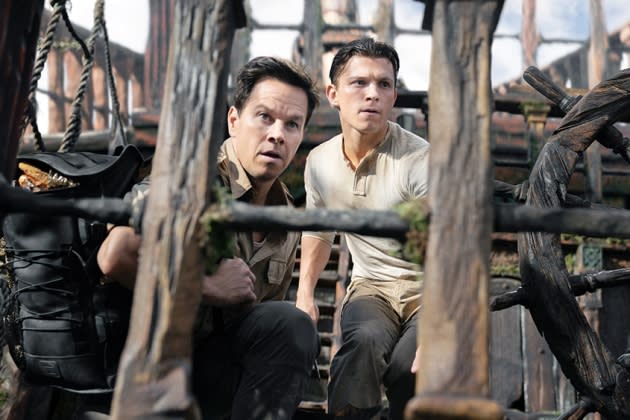Media Companies Find New Ways to Exploit Their IP as Innovation Drives Content Creators
- Oops!Something went wrong.Please try again later.

Intellectual property is what fuels today’s Hollywood. As the industry has become more risk-averse, fewer truly original screenplays are getting made, and ones that seem to be original often have some tie-in with recognizable properties (from music to video games to crime cases and other true stories), attaching most any given project to a proven success or brand. “Within the industry, it kind of gives executives and studios a little bit of cover, in the sense they’re able to say, ‘Look at this thing that already exists,’” notes producer/screenwriter James Vanderbilt, CCO of Project X Entertainment.
Vanderbilt is one of the panelist for Nov. 2’s AFM panel: Inspiration Is Everywhere: Accessing & Adapting IP for the Screen, alongside Margaret Boykin, VP development of film and television for the gaming company Ubisoft, and Charles Hopkins, director of development and production at Concord Originals. Moderated by UTA Media Rights Group co-head Jason Richman, the discussion will center on how writers, producers and distributors can identify IP from unlikely sources, then develop and produce projects from them.
More from Variety
Cinedigm Nabs North American Rights to Black Comedy 'Holy Shit!' (EXCLUSIVE)
AFM Returns In-Person, But Is It Time to Rethink Its Purpose?
Cage Fight Action Movie 'Fight Pride' Sold to German, Polish Distributors (EXCLUSIVE)
The top eight box office hits this year have been sequels or reboots, with a biopic (“Elvis”) and video game adaptation (”Uncharted”) rounding out the top 10.
Taking advantage of this new paradigm, more companies with IP catalogs are developing projects in-house or bringing them to studios. “Rather than waiting for the phone to ring, it’s about our team proactively identifying IP under our roof, then building out creative briefs and producing strategies to jumpstart all manner of projects,” said Hopkins. His division was created last year to utilize Concord’s extensive catalog of music and theatrical rights to create new movies, TV shows and podcasts.
Some of the Concord projects are straightforward, like using footage from Creedence Clearwater Revival’s 1970 European tour for a recent Netflix doc, “Travelin’ Band.” Others require thinking outside the box and, as with talent agency packages, aim for synergy when possible: the division is using the catalog and folklore of musician Robert Johnson as the basis for a fictitious thriller, “The Bluesman,” penned by a playwright Concord publishes, Aleshea Harris.
“There’s a lot of creative opportunity within IP adaptation; it’s not just coloring inside the lines,” says Boykin. She cites the 2021 horror comedy “Werewolves Within,” based on a virtual reality game set in medieval times. “But we really use that as a jumping off point for the movie, which told a modern story.” Though it underperformed at the box office, she notes that it’s the highest-rated video game adaptation on Rotten Tomatoes. Another Ubisoft project, the comedy “Mythic Quest,” avoids any straightforward adaptation, instead offering a behind-the-scenes look at a fictional video game company. Apple TV+ premieres its third season on Nov. 11.
Vanderbilt has written a wide range of features, from “The Amazing Spider-Man” to the Robert Redford-led indie drama “Truth” (based on a book about Dan Rather’s George W. Bush reporting) to this year’s “Scream” reboot and next year’s sequel “Scream 6.” “With different sorts of IPs, when it’s not necessarily a direct adaptation of something, it can almost be at Trojan horse in which to tell your own stories,” he says. He goes on the cite his WGA-nominated work on “Zodiac” which, though based on Robert Graysmith’s nonfiction book “Zodiac Unmasked,” incorporated “an enormous amount of outside research” to include more about the police detective and reporter involved in the serial killer case.
“There’s been such a crazy run in terms of the increase in volume of the deals on our end, and just the desire and need for underlying materials driving the conversation across the film and television landscape,” says UTA Media Rights Group’s Richman. ”Business is better than ever.”
But while Hollywood will likely continue hedging its bets with IP for a while, Vanderbilt takes a different view. “There is no ‘sure thing’ IP, unless you’re making a Batman or Spider-Man movie,” he says. “It’s always sort of a pendulum, and we may be reaching a saturation point with [IP]. I think things are going to swing the other way, and people are going to be interested in original stuff a little more.”
VIP+ Special Report: Firing Up Fans to Be YouTube Creators
Sign up for Variety’s Newsletter. For the latest news, follow us on Facebook, Twitter, and Instagram.
